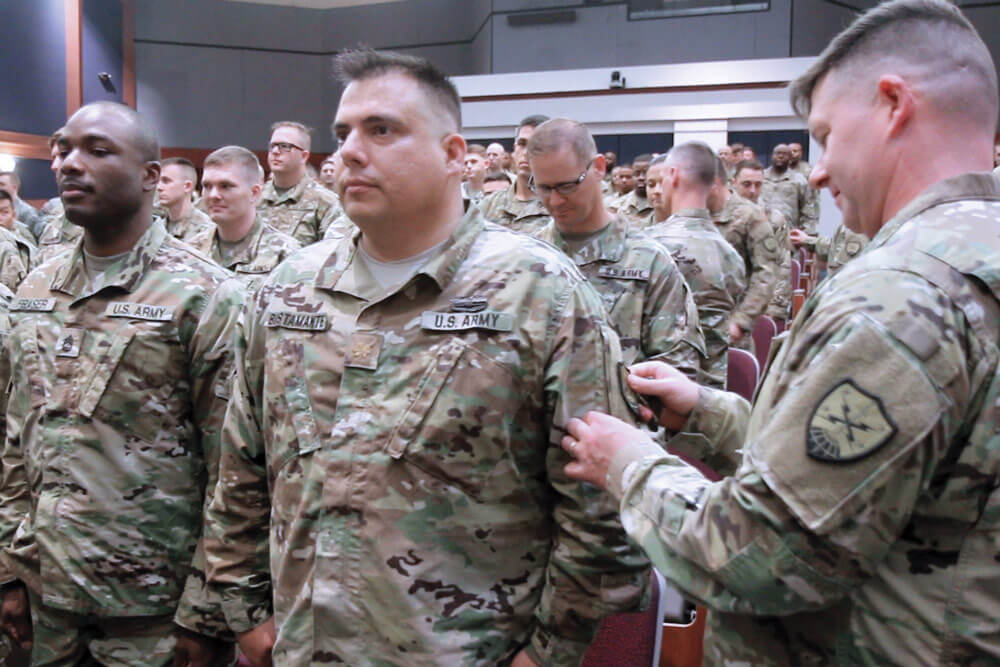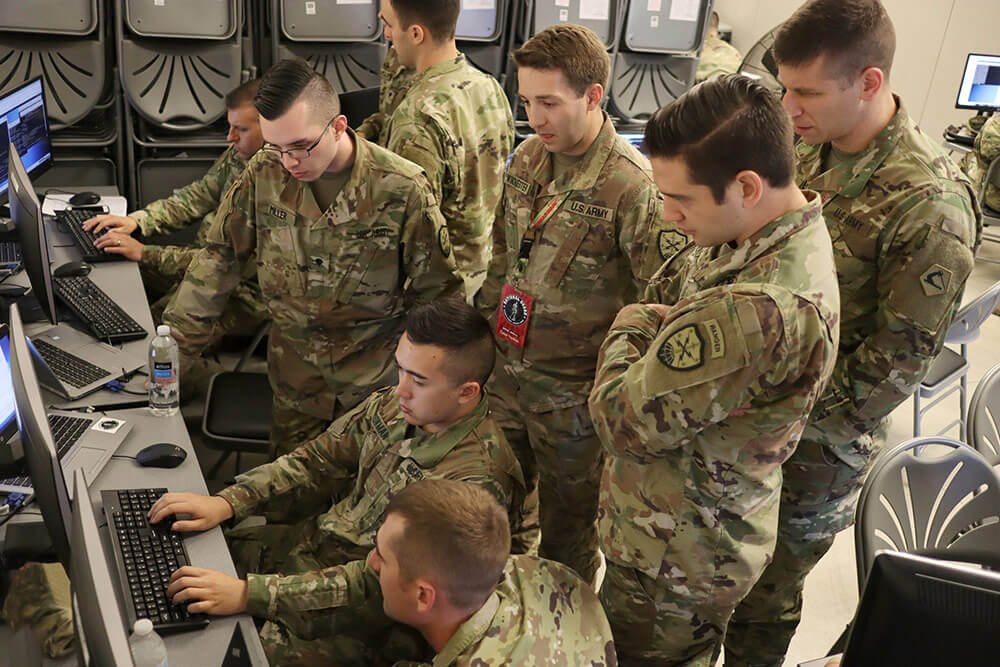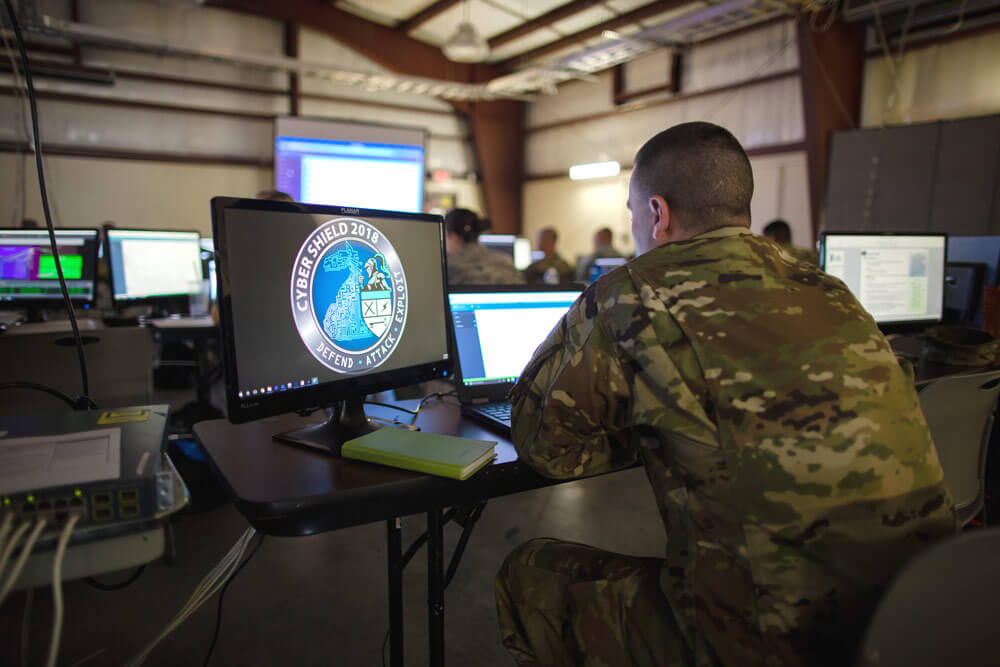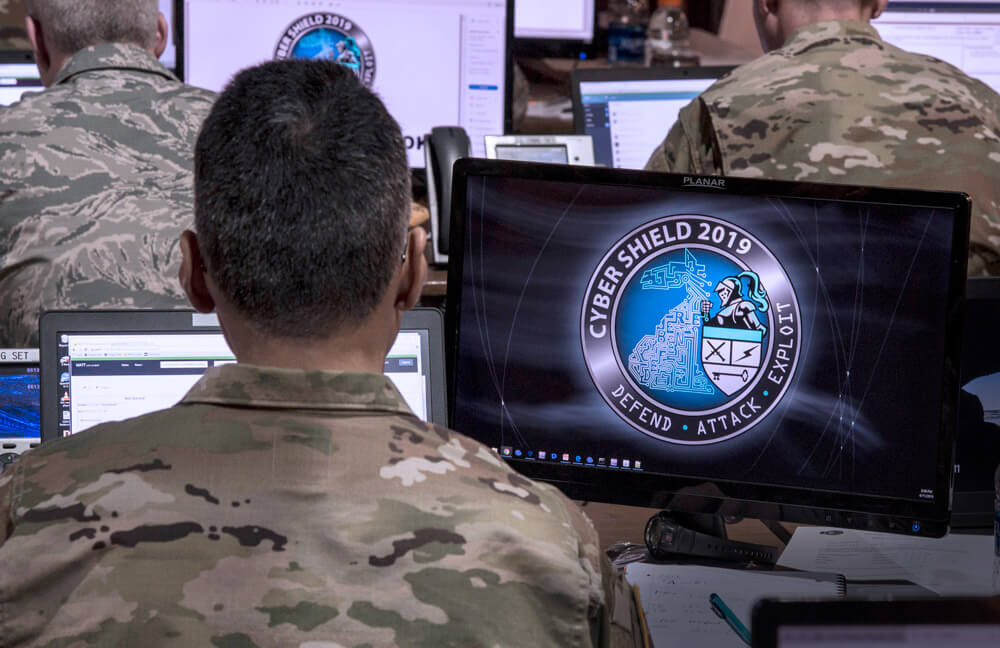On Sept. 17, 2017, the Virginia National Guard activated the 91st Cyber Brigade, the Army National Guard’s first brigade-level cyber force.
The 91st Cyber Brigade, also known as the Shadow Brigade, was activated at a ceremony at Fort Belvoir attended by LTG Timothy Kadavy, Director of the Army National Guard, MG Timothy P. Williams, Adjutant General of Virginia, Virginia Governor Terry McAuliffe, along with other senior military and civilian leaders, Soldiers and Family members.
“Starting today and moving forward, the 91st Cyber Brigade will play a crucial role in our national defense,” LTG Kadavy said. “The Citizen-Soldiers of the Shadow Brigade are a prime example of how highly skilled Army National Guard personnel bring state-of-the-art skills to their part-time service to carry out the Total Army effort. Today’s ceremony represents a leap forward for the Army, the Department of Defense (DoD) and our entire country.”
The brigade has been assigned to provide training and readiness oversight for cyber units across 30 States. With a motto of “UMBRA BELLATORES,” which translates to Shadow Warriors,” the brigade will employ skilled personnel to meet the demands of growing cyber mission sets throughout the Army and the DoD.
“We have had capability among the 54 States and Territories for a number of years,” said COL William Zana, Commander of the 91st Cyber Brigade. “The Nation’s recognition, and the Army’s recognition, that we need to leverage [our combined] civilian and military skill sets is what brought us to forming and placing a brigade.”
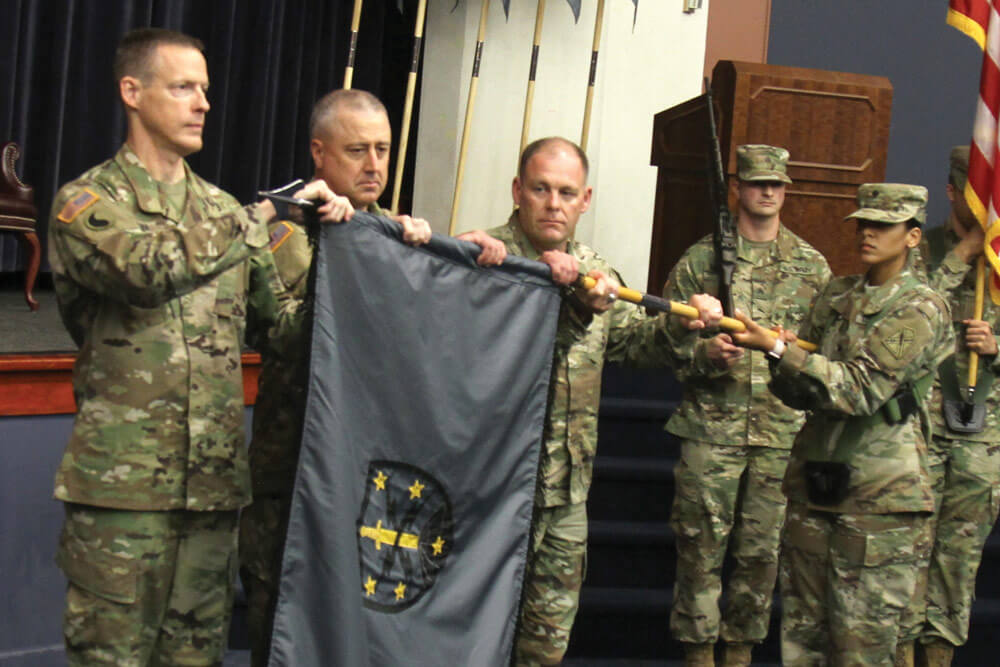
The 91st Cyber Brigade commands approximately 950 traditional status Army National Guard officers, warrant officers and enlisted Soldiers. Within the brigade, the Army National Guard has stood up five cyber battalions. Each battalion headquarters, which consists of approximately 25 personnel, will have four subordinate units that will consist of 35 to 40 personnel. A cyber security company, a cyber warfare company and two cyber protection teams make up the four subordinate units.
“The Cyber Protection Teams are largely focused on Department of Defense information networks,” COL Zana explained. “Our Cyber Warfare Companies are more focused on the full spectrum [of cyber security threats], while our Cyber Security Companies are focused on civilian networks and other networks that may not be as familiar to us.”
General duties for all units of the 91st Cyber Brigade will include conducting cyber analysis, vulnerability assessments and defensive cyberspace operations on military networks. With Gov. McAuliffe deeming cyber-attacks the greatest threat facing the Nation, the creation of the cyber brigade addresses a critical and constantly evolving national security risk.
“There’s a new threat that comes out every day,” said SSG Ricardo Forde of the 133rd Cyber Support Company. “We have to stay educated and on top of our game so that we can defend against those threats.” -SSG Ricardo Forde
“As part of the cyber brigade and the broader element in support of Army cyber, we are at the forefront of technology,” said 1LT Matthew Leybold of the 91st Cyber Brigade. “It’s cutting edge, [the brigade] is directly addressing a lot of problems that [are affecting people today].”
The initial concept of the 91st Cyber Brigade was presented by the National Guard Bureau to the U.S. Army in June 2016 and was approved in February 2017. The brigade was reflagged from the Virginia National Guard’s 91st Troop Command. The 123rd Data Processing Unit, based out of Fairfax, Va., was split into the 123rd and 124th Cyber Protection Battalions. Also serving under the brigade are the 125th and 126th Cyber Battalions stationed in Columbia, S.C., and Hanscom Air Force Base in Bedford, Mass. One additional battalion has yet to be stationed. Additionally, the cyber brigade will provide training and validation management for 10 previously approved Army Cyber Protection Teams that are stationed in various States across the country.
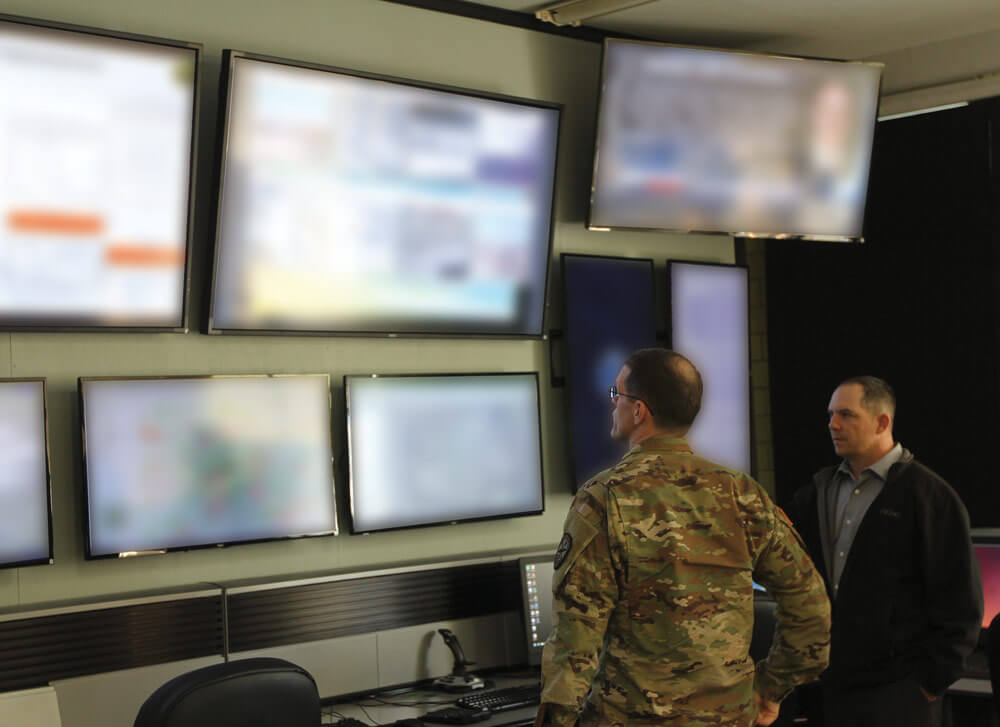
The Shadow Warriors have a unique unit insignia featuring a quartered shield that incorporates a pixelated pattern. This pattern represents technology and its place in the future of warfare. The shield also features a sword to signify the brigade’s defensive and offensive capabilities. Their shoulder sleeve patch also uses a sword to represent military capability, lightning bolts that represent information-technology and signal transmissions, and stars that represent the first five cyber protection battalions.
The unit colors are black, steel gray and gold. The black signifies cyberspace, security and a new frontier; the steel gray signifies fortitude, mettle and endurance; the color gold signifies the excellence, expediency and expertise of the brigade.
The need for traits like expediency and expertise is never more crucial than it is in the field of cyber security. The sheer speed and complexity with which things move in a cyber environment calls for a dizzying level of agile defense layers.
“You have to have a defense everywhere,” COL Zana said. “You don’t know exactly where and when you are going to have adversary forces. Those adversary forces can be anything from a nation state, to a potentially small criminal actor, to an organization within or outside of criminal organizations. That 360-degree perimeter is almost impossible so you have to look at where your priorities are.”
According to COL Zana, when it comes to federal missions, the brigade focuses largely on domestic state actors, nation state actors and extremist organizations. On a State level, however, the type of threat can be broader. The challenge becomes providing a good defense in all spaces and having the capabilities for a full-spectrum response.
“Vulnerability is a challenge for us,” said COL Zana. “If you look at all of [the] things that are now wired in or somehow connected to the internet, many of those do not have inherent cyber security or protection. There’s just a huge number of different ways that we can be vulnerable to attack.”
A specific area of vulnerability COL Zana highlights is the Army’s weapons systems.
“Our weapons systems and platforms can be dated, and they may be designed prior to us really realizing what a threat could be,” COL Zana said. “That goes from high-end complex systems like an Apache or Black Hawk helicopter or an M1 Abrams, down to communications systems. Even logistical or personnel administration systems where you can have sensitive data or information – all of those present different vulnerabilities for different parts of the force.”
Contrary to popular misconceptions, cyber security is not confined to online Internet activity.
“An enemy’s targets include physical things [like] power grids, industrial infrastructure, data centers [or] repositories of sensitive data such as financial or medical information. They can also target people directly,” said SPC Abhimanyu Trikha of the 134th Cyber Support Company. “These can be high-profile people, CEOs, commanders, or they can be people that are not as high on the chain, but may have knowledge that can empower them to go after those high-level figures.”
Not only is there a wide range of cyber-attack methods, there is also a large spectrum of actors that could present a threat.
“You have the full range of potential actors,” COL Zana explained. “From an individual who is just sitting on their computer at home or at an internet café to the high-end threat of another nation that has similar capabilities and [is] looking to take their version of the cyber brigade or cyber battalion to really do something much more comprehensive against either Department of Defense information networks, military networks, or potentially civilian infrastructures like banking, utilities or things like that.”
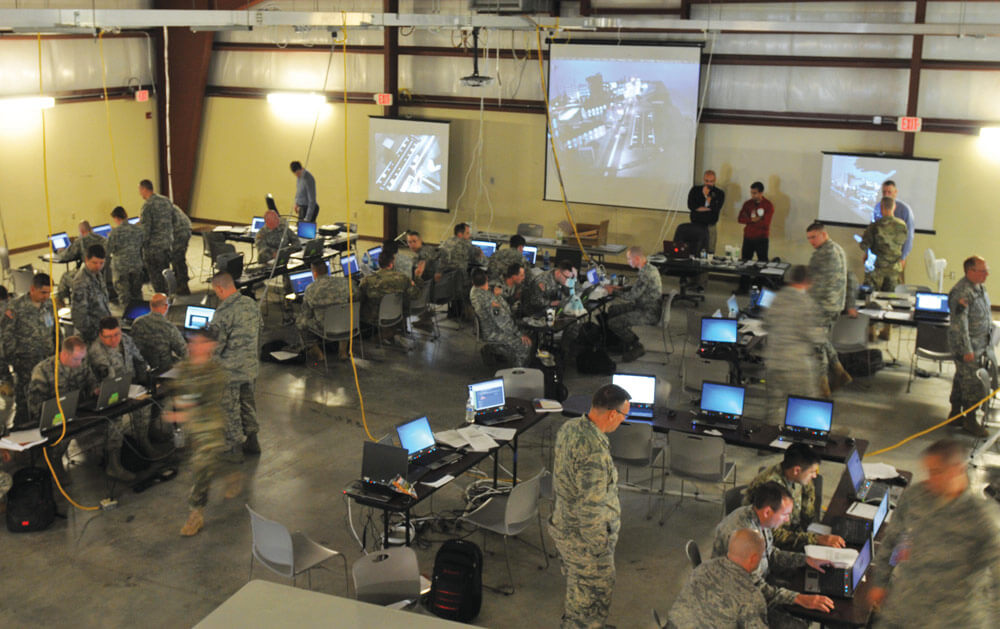
While there are numerous threats in the world of cyber, thanks to the training and knowledge of the Soldiers of 91st Cyber Brigade, the majority of those threats already have an identified solution.
“We respond to a lot of threats,” 1LT Leybold said. “I’d say there’s an 80/20 rule where perhaps 80 percent of the things we see are threats, vulnerabilities, [or] some sort of problem that we do have a solution for.”
1LT Leybold went on to explain that the cyber brigade is fast, agile and proactive in attending to the 20 percent of threats for which they do not have an immediate approach to solving.
“What I try to do is help solve for the future State threats that we don’t have a solution for,” 1LT Leybold continued. “My responsibility is to be dynamic and reactive, and problem-solve for those new threats.”
According to COL Zana, their team of extremely capable and highly talented Soldiers is the “center of gravity” of the brigade’s success. LTG Kadavy confirmed the linchpin quality the Soldiers bring to the brigade.
“National Guard cyber warriors are not easy to grow,” LTG Kadavy said. “They possess a unique combination of military training, civilian credentialing and cyber-security certifications. Forming the 91st Cyber Brigade required meticulous planning, relentless hard work and focused recruiting to find qualified Soldiers capable of taking on the constantly evolving mission.”
For those qualified Soldiers, the Army National Guard’s dedication to cyber has created career opportunities that are unlikely to be matched elsewhere.
SPC Malcolm Brown of the 134th Cyber Support Company joined the Army National Guard because of the opportunities the cyber unit presented. “I wanted to see two different aspects of what it meant to work in cyber,” SPC Brown said. “I get the experience of seeing cyber on the side of the military, and also I get to see it on the civilian side. It’s a great way to educate yourself and your peers to have a broader perspective about what you are facing.”
SPC Brown emphasized the importance of having a drive for the cyber field. He explained, “I’ve become a more knowledgeable IT Specialist. I’ve become more valuable in the market. I’m equipped with a lot more skill sets, and I’ve gotten a lot more passionate about what I want to do. I’ll continue to do this for a long time.”
SGT Bernita Fisher of the 91st Cyber Brigade noted her enthusiasm for finding unexpected ways to battle enemy cyber forces.
“I think a lot of times when people look at the Army, they think that we all fight with our hands, but oftentimes that’s not the case,” said SGT Fisher. “I think being in the cyber world and being able to attack the enemy in such a unique way, is really what makes me excited [about serving with the brigade].”
CPT Tim Schilbach of the 143rd Cyber Warfare Company has seen first-hand how cyber skills can translate in a tactical environment. He has deployed within the United States and overseas in support of Army cyber missions.
“We have been doing a lot of exciting things in protecting the battlefield and protecting our fellow Soldiers on the battlefield,” CPT Schilbach said. “These new emerging cyber warfare technologies are going to save lives and do things where you can’t have boots on the ground. Using all the cyber platforms that we have at our disposal, staving away criminals, foreign actors and terrorist organizations from our shores has [all] been very rewarding in my career.”
The activation of the 91st Cyber Brigade is a significant moment in the history of Army cyber operations. The dedicated Soldiers of the Shadow Brigade are proving that the Army National Guard is always ready and always there, even when “there” is in cyberspace.
“We are the first [military] responders to fires, floods, hurricanes and when infrastructure topples and everything goes away. The National Guard mobilizes and ensures that the population is safe,” said CPT Schilbach. “Army National Guard [Soldiers] are first responders on the digital battlefield [as well], ensuring that our Nation and our infrastructure remain safe.”
By Staff Writer Drew Lansbury
